Childhood Education Innovations
Celebrating 100+ Years of Publication!
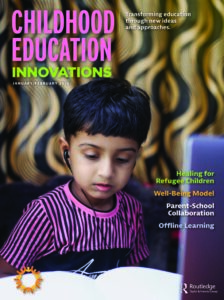
Childhood Education Innovations provides a unique, stimulating breadth of information about educational practices, approaches, programs, and initiatives from around the world.
Articles explore solutions to specific challenges affecting schools, teachers, and learners and showcase innovations being developed and implemented to address those challenges. Readers will find inspiration for transforming education to better serve children and their communities.
Published 6 times a year, Childhood Education Innovations provides a window into the work being done to bring quality, equitable education to all children and with a reasonable price of only $50 per year (online).
Childhood Education Innovations stands alongside our research journal — the Journal of Research in Childhood Education — as one of our signature publications.
Sneak Peek of the March/April 2026 Issue ArchivesSubmission Guidelines
January/February 2026 Contents:
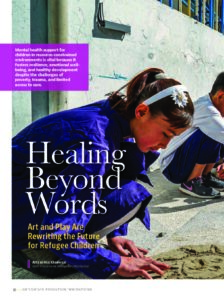 “Healing Beyond Words: Art and Play Are Rewriting the Future for Refugee Children”
“Healing Beyond Words: Art and Play Are Rewriting the Future for Refugee Children”
In the arid landscapes of Quetta, Baluchistan, Pakistan, a generation of children is grappling with the wounds — both visible and invisible — of war and displacement. Afghan refugees and local host community members alike are united by a shared exposure to profound trauma. For years, the mental health needs of these vulnerable children have gone critically underserved, with traditional, talk-based therapies proving inaccessible, culturally inappropriate, or ineffective. An innovative, youth-led initiative from the Youth Association for Development (YAD) is reimagining what psychosocial support can look like. Through the power of art, music, and play, YAD is not just treating trauma, it is embedding healing directly into the educational fabric of the community.
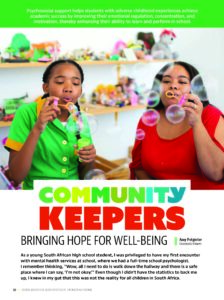
“Community Keepers: Bringing Hope for Well-Being”
While school is primarily a space for learning and academic growth, learners also have the opportunity while there to build connections, develop their personalities, and gain life experience. School impacts subjective well-being, which positions it as a potential protective factor for learners. Seeing both the gap and the opportunity, Community Keepers introduced a school-based mental health and well-being model and have seen encouraging results. When learners are given a safe space to talk to a supportive adult who truly listens, they can find hope, resolve trauma, break free from the downward spiral, and begin a journey toward a place of well-being where they can thrive. Community Keepers have also found that when learners feel a sense of belonging, they engage more, participate with enthusiasm, and are less likely to drop out.
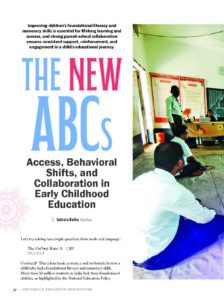
“The New ABCs: Access, Behavioral Shifts, and Collaboration in Early Childhood”
In India, consistent efforts to involve parents remain limited. A lack of policy focus on behavioral incentives and technology for parental engagement has hindered meaningful collaboration, leaving children at a continued disadvantage. To address the ongoing learning crisis in Odisha, India, the ThinkZone social enterprise empowers parents and educators to develop children’s foundational skills. The ThinkZone approach is built on three key pillars: access, behavioral shifts, and collaboration. This ensures active engagement of both parents and educators to enhance children’s learning outcomes.
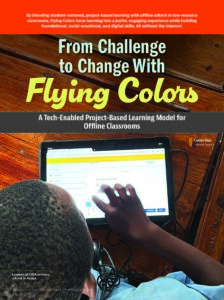
“From Challenge to Change With Flying Colors: A Tech-Enabled Project-Based Learning Model for Offline Classrooms”
For far too many children, equitable and needs-driven opportunities remain out of reach. And getting children into classrooms isn’t enough. What they experience once there matters profoundly. We have the chance to rethink education from the ground up: not as a system built around connectivity and infrastructure alone, but rather as one rooted in openness, equity, and community leadership. Learning Equality works to design learning that is inclusive, offline-accessible, culturally resonant, and deeply student-centered — meeting learners where they are, and honoring who they are.
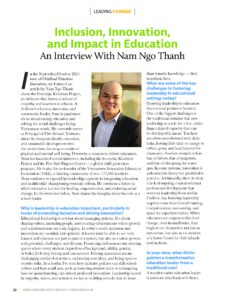
“Inclusion, Innovation, and Impact in Education: An Interview With Nam Ngo Thanh”
A dedicated educator, innovator, and community leader, Nam Ngo Thanh is passionate about transforming education and solving the social challenges facing Vietnamese youth. He currently serves as Principal of Elite School, Vietnam, where he integrates health education and sustainable development into the curriculum, focusing on students’ physical and mental well-being. Nam continues to expand his leadership capacity in integrating education and health while championing systemic reform. He envisions a future in which education is a tool for healing, empowerment, and enduring social change. In this interview, Nam shares his thoughts about his role as a school leader.
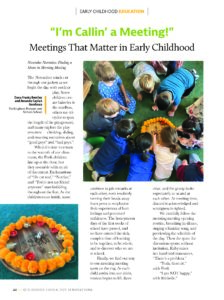
“‘I’m Callin’ a Meeting!’ Meetings That Matter in Early Childhood”
In the authors’ classroom, morning meeting is where community, curriculum, relationships, and questions are constructed and examined. With scaffolding, children themselves are empowered to collaboratively shape and develop topics that are relevant to them. This article explores strategies for facilitating discussions, gathering observations, and creating inclusive rituals that make meetings a space for connection, leadership, and authentic learning. The authors address both the high-level concepts that guide their thinking, as well as the practicalities that enable children’s citizenship and leadership.
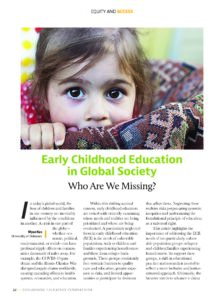
“Early Childhood Education in Global Society: Who Are We Missing?”
Early childhood educators are tasked with critically examining whose needs and realities are being prioritized and whose are being overlooked. A particularly neglected focus in early childhood education (ECE) is the needs of vulnerable populations, such as children and families experiencing homelessness and those from refugee backgrounds. These groups consistently face systemic barriers to quality care and education, greater exposure to risks, and limited opportunities to participate in decisions that affect them. Neglecting these realities risks perpetuating systemic inequities and undermining the foundational principle of education as a universal right.
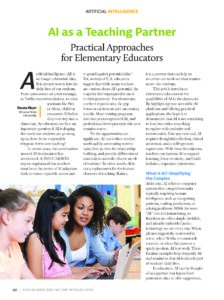
“AI as a Teaching Partner: Practical Approaches for Elementary Educators”
This article introduces elementary educators to the possibilities of AI in the classroom. By highlighting nine accessible AI platforms and offering practical applications, the hope is to demonstrate that AI is not something to fear, but rather something to explore with curiosity and intentionality. Like any new tool, AI requires thoughtful reflection, ethical awareness, and a willingness to experiment. With those foundations, teachers can harness AI to support learning, foster creativity, and build inclusive, responsive classrooms. AI is not a replacement for the human elements of teaching. Rather, it is a partner that can help us re-center our work on what matters most — the students.
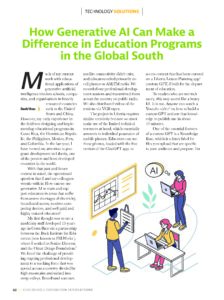
“How Generative AI Can Make a Difference in Education Programs in the Global South”
How can we use generative AI to train and support educators in areas that suffer from severe shortages of electricity, broadband access, modern computing devices, and well-paid and highly trained educators? New technological tools at our disposal are evolving rapidly to add functionality that can benefit educators and learners throughout the world. Unlike prior innovations, generative AI can become an effective thought partner. In this article, the author presents ideas to spark inspiration and sources to access for designing AI-powered solutions.
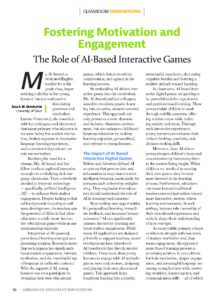
“Fostering Motivation and Engagement: The Role of AI-Based Interactive Games”
In classrooms, AI-based interactive digital games are proving to be powerful tools for experiential and problem-based learning. These games enable children to work through real-life scenarios, offering reinforcement while reducing anxiety and stress. Through such interactive experiences, young learners can enhance their critical thinking, creativity, and decision-making skills. By embedding such tools into daily instruction, educators can cultivate a sense of playfulness and motivation, ultimately enhancing children’s emotional well-being and academic engagement.
